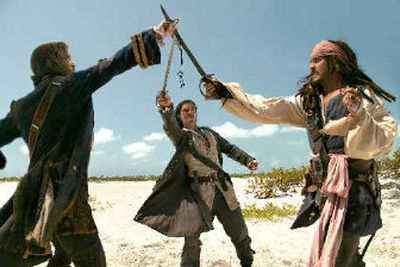Arrrr, there be sponsors aboard!

Walt Disney Co.’s “Pirates of the Caribbean: Dead Man’s Chest” hits theaters on Friday during a hail of marketing tie-ins pelting consumers like grapeshot.
Volvo, Kodak, Kellogg’s, Visa, MySpace and Verizon are among companies latching on to the sequel to the surprise 2003 blockbuster, “Pirates of the Caribbean: The Curse of the Black Pearl.”
When Disney’s first “Pirates” movie was announced, plenty scoffed: a movie based on an amusement park ride? The laughter abruptly stopped after it grossed $47 million in its opening weekend, ending up with $653 million in worldwide revenue. Johnny Depp’s Captain Jack Sparrow was a strange and likable character, a sort of fey Keith Richards in pirate garb, good enough to receive an Oscar nod.
This time, the corporate sponsors couldn’t board fast enough.
Others have latched on to the “Pirates” launch, though they are not official sponsors or partners. The History Channel’s “True Caribbean Pirates” airs two days after the movie opens; Legoland, a California amusement park, just opened its Pirate Shores ride.
Oren Aviv, vice president of marketing for Disney Studios, said he doesn’t mind the hangers-on. “It only confirms, at least in my mind, that we have something really amazing here,” he said. “We had a number of sponsors last time, but not as much stuff going on as this time.”
Part of the appeal speaks to the popularity of the film franchise, but another part speaks to the enduring appeal of the storybook notion of a buccaneer. From the “Pirates of Penzance” to Long John Silver’s, pirates have been a reliable draw for decades.
Sparrow is the kind of a pirate that makes kids don eye patches at Halloween and grown men walk around the office growling, “Arrrr!” Sparrow is a thief, but he is a clever scoundrel, a rapscallion, more likely to do harm to his standing in the pirate community than to an enemy. He is a thumbed nose in the face of British colonial authority; i.e., he sticks it to ye olde man. And advertisers know many of their customers imagine those traits in themselves.
Another branding expert, Steve Addis, agrees.
“They have been romanticized beyond just thieves,” he said. “They project a maverick personality, a free-spirited independent personality. It’s an easy way (for a brand) to say, ‘I’m not a conformist.’ It’s shorthand.”
As Captain Morgan rum commercials asked viewers, “Got a little captain in you?”